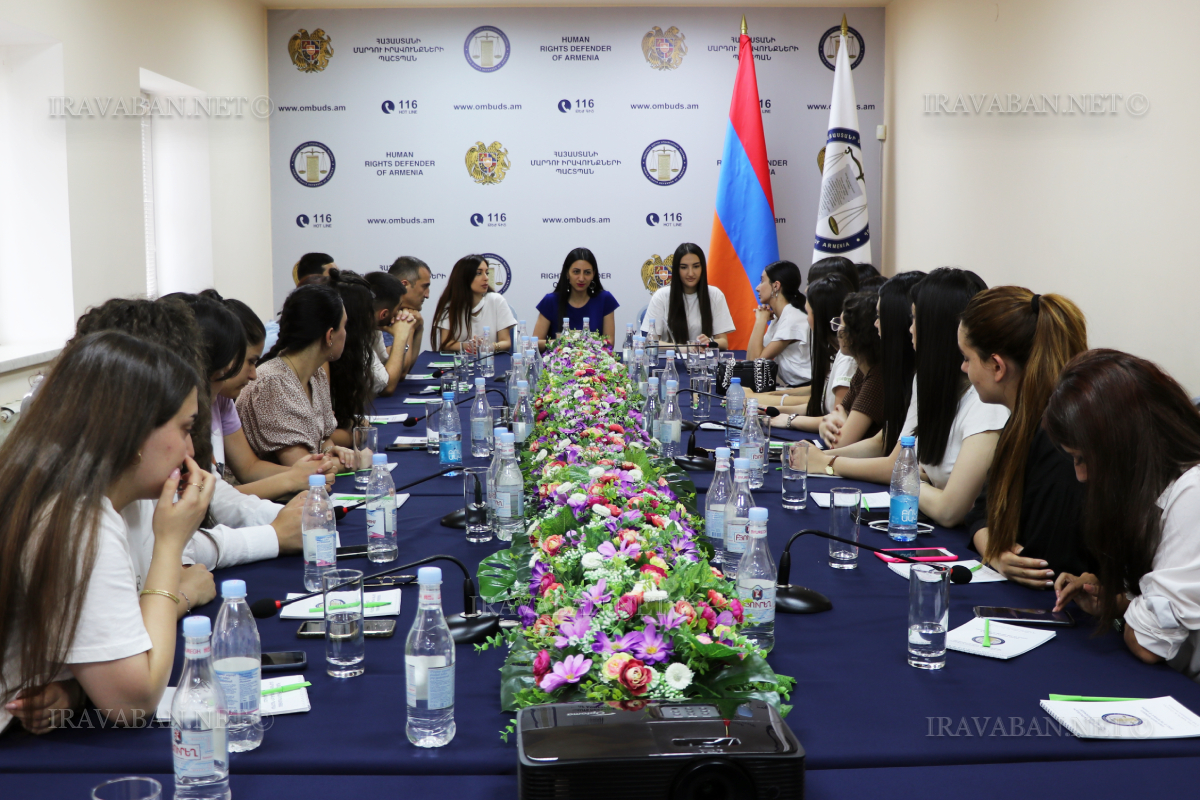The Students of the Anti-Corruption School for Young Leaders met with Human Rights Defender Anahit Manasyan

On 24 July, the students of the 9th stream of the Anti-Corruption School for Young Leaders, the 1st anti-corruption professional educational initiative operating in the Republic of Armenia, within the framework of the master classes and practical skills development phase of the 9th stream of the school, where were hosted at the Office of the Human Rights Defender and met with Anahit Manasyan. 2 more students from Artsakh joined the meeting through the Zoom platform.
Anahit Manasyan presented the Ombudsman’s mandate, the organization’s mission, directions and priorities of the work. In the conversation with the students, she mentioned once again that the Institution of the Human Rights Defender is an independent, non-political structure, whose mission is to protect human and individual rights, in case the state bodies violate them.
“This is the role of national human rights institutions around the world. It is very important that we all understand and comprehend this methodology correctly. It is also important from the point of view of correct and effective work on international platforms,” Anahit Manasyan said.
During the question-and-answer discussion, the students asked a number of questions about the sector.
The violations of the rights of the border population of Artsakh and RA, the activities carried out by the Defender in the international arena, as well as the Armenophobic policy encouraged at the state level in Azerbaijan were also discussed with the students.
The Defender also referred to manifestations of intolerance and hate speech in public communication. “Discrimination and hate speech are extremely dangerous phenomena. In particular, those people who have model behavior and are an example for society should exclude the use of such speech. It is the responsibility of each of us to create such an environment where we can all live in harmony. We should not allow these problems to grow and deepen with the snowball effect,” the Human Rights Defender said.
At the end of the meeting, Anahit Manasyan thanked the students for the active and meaningful discussion, emphasizing that although anti-corruption issues do not occupy a large volume within the scope of her mandate, such discussions are very important from the point of view of the formation of the general environment and functions.
Notably, the training in the Anti-Corruption School for Young Leaders will be organized in the following phases:
- ONLINE TRAINING PHASE, during which the students will pass a basic anti-corruption course consisting of 25 topics through the school’s online anti-corruption training platform. Those students who have completed all the knowledge test questionnaires and received the appropriate points for completing the online training will be considered completed the online training phase.
- MASTER CLASS AND PRACTICAL SKILLS DEVELOPMENT PHASE, during which students who have successfully completed the advanced stage of school will be divided into groups and each group will conduct a study, monitoring or investigation on one of the in-depth anti-corruption topics. During this phase, the work will be organized in the form of group meetings, discussions, and meetings with representatives of the sectors and other relevant bodies and organizations. Attendees will learn a range of innovative tools and gain related skills. At this stage, mentoring for groups is planned.
- PUBLIC AWARENESS PHASE, during which students who have successfully completed the practical skills development phase of the school will have the opportunity to disseminate their anti-corruption knowledge among young people through public awareness seminars.
- ADVANCED TRAINING PHASE, during which the best 15-20 participants who have achieved high results in the online training phase of the school, successfully completed the in-depth interview phase and are selected, will participate in the outreach (out of Yerevan) in-depth anti-corruption training. The in-depth training phase of the school will consist of the modules: “Anti-Corruption Advanced Training” and “Pillars of National Identity”.
- FINAL PHASE, during which the students, who have successfully completed the practical skills development and public awareness stages of the school, will present their research and public awareness results to the reputable jury and the public.
Students who have passed and successfully graduated from all five phases of the School will be awarded GRADUATION CERTIFICATES of Anti-Corruption School for Young Leaders.
“The Armenian Lawyers’ Association” NGO is organizing the Anti-Corruption School for Young Leaders in cooperation with the CSO Anti-Corruption Coalition of Armenia.
The information partner of the Anti-Corruption School for Young Leaders is Iravaban.net, independent professional news website.
